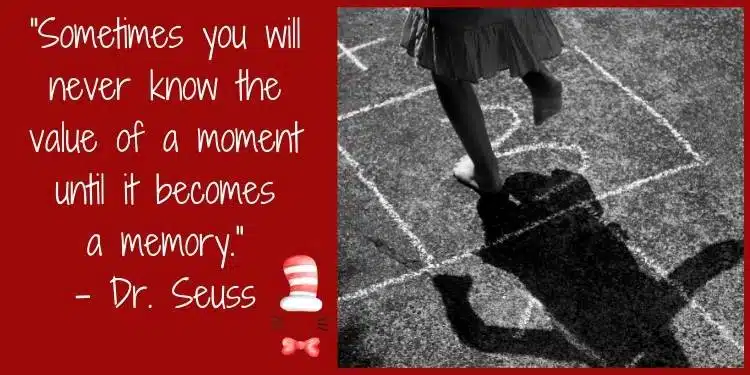by Leslie Farin
Lately, I find myself immersed in childhood memories when visiting with Dad, age 92, perhaps because I have become increasingly aware of his mortality. Watching him decline both physically and mentally, I feel angry and powerless. He is not the person I once knew. As the great Bette Davis once said, “Aging is not for Sissies!”.
Though Dad no longer has any short-term memory at all, I am grateful for his excellent long-term memory recall, which allows us to converse about the past. These conversations help him to recall moments that were dormant for years. As Dad’s dementia progresses, I seem to reflect on these nostalgic memories more than ever.
There were plenty of “big” family moments, the important life milestones, but those most special to me are the ordinary moments. The seemingly insignificant ones.
The Significance of Childhood Memories
Life is filled with everyday moments that may seem mundane, but often they are the building blocks of our happiness and fulfillment. As I mature and age, I better understand my dad’s behavior and parenting, and am grateful for both the positive and the negative memories. I appreciate the joys the happy ones bring, as well as the lessons I learned from the difficult ones.
Childhood memories play a significant role in shaping our identity and overall well-being. I did not understand the challenges Dad faced when raising me and my siblings, but as I age and mature, I see them more clearly. I better understand him and the experiences that shaped who he became as an adult and a parent. He was not perfect and made mistakes, as all parents do. But he did a lot right, and I grew up feeling comfortable, loved, and safe in my home. He worked hard to provide a happy childhood for me and did the very best he could. What more can you ask for?
My Best Childhood Memories
Here are a few completely random memories in no particular order that are not exactly momentous, but are incredibly significant to me.
Family Dinners
Every night, with few exceptions, Dad arrived home from work at 5:15 p.m. All seven of us sat down to a family dinner at 6:00 p.m. It was not optional; My parents expected us all to have dinner together, whether or not we were hungry. They were always good about not forcing us to eat just because it was dinner time. We were not told to finish everything on our plates as people were starving elsewhere, a common sentiment at that time. In contrast, my folks encouraged us to eat only when hungry, which I realized as an adult laid the groundwork for healthy eating habits later in life. If we had a lot of homework, we did not have to stay long at the table, but we did need to show up. We were not allowed to answer the phone during that time, and truthfully, we rarely received calls during normal dinner hours, for example, between 5:30 and 7:00 p.m., unless there was an emergency. Our friends and neighbors respected that dinner time was family time.
I loved that tradition and wish I was able to replicate it when raising my own children. By that time, though, there was no standard “dinner time”. With cell phones, crazy work hours, and an abundance of activities for the kids, it was rare for us all to be home together to enjoy a meal at dinner time.
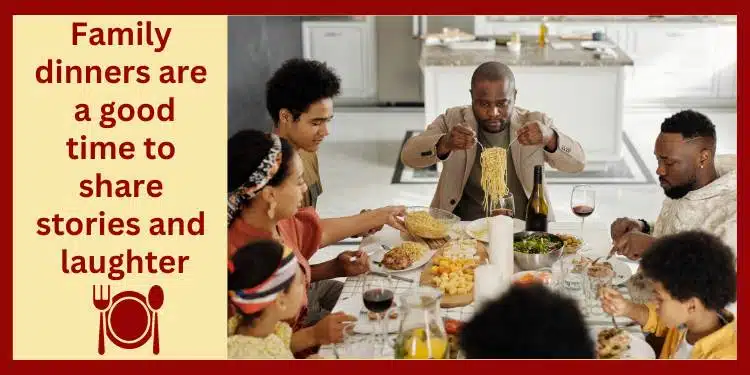
Making Forts with Blankets
When I was a child, we did not have a lot of electronics to keep us occupied. We used our imagination, along with blankets, pillows, and couch cushions to create something magical, a fort. Our folks let us build massive structures in the living room and leave them up for weeks. I loved having a quiet secret space that didn’t go away quickly. It felt safe and cozy, and we entertained ourselves for hours there. How wonderful that our folks believed it was more important to nurture our creativity and imagination than to keep the house looking neat and tidy for company. This was unusual in our neighborhood and likely one of the reasons the other kids gathered at our home more than any of the others.
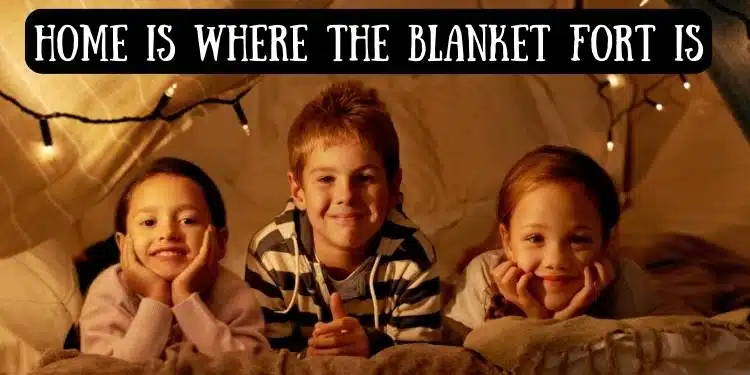
Our First Color Television
I was 13 years old in 1974 when our family purchased our first color television set. It was a big deal. Color TVs first hit the stores around 1972, but it wasn’t until 1974 that the prices started to come down making them more affordable for the average consumer. The whole family, all seven of us, piled into the station wagon, sans seatbelts of course, and off we went to Sears. We spent an hour there looking at the available sets, comparing the colors on the screen, and debating which was best. As our family did often, we held a vote to determine which to purchase and went with the majority. It was a really fun day and a very special memory. Dad paid for the TV, arranging for it to be delivered later in the week as it would not fit in the car with all of us. We were giddy with excitement and couldn’t wait. It feels like yesterday and it’s hard to believe that experience happened almost 50 years ago. It’s a different world today, one my children don’t understand. TVs are larger, easily accessible, and more affordable.

Reading by Candlelight
We had a wonderful tradition in my family on Friday nights. After dinner, we sat on the floor gathered around the coffee table and listened to Dad read Sherlock Holmes stories by candlelight. We did one chapter each week, which left us anxious to hear more the following Friday. I remember the flickering candlelight that illuminated the darkness that felt so magical.
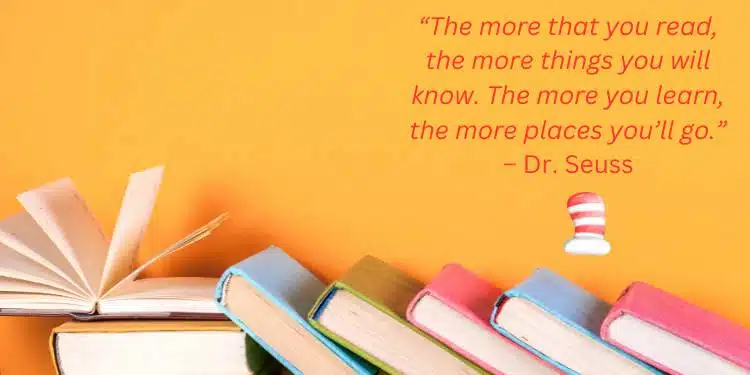
Losing a Tooth
As the fourth kid out of five, I watched with envy as my older siblings lost their teeth for years before it happened to me. One by one, they put their teeth under their pillows, finding a shiny new quarter in the morning in its place. I remember losing my first tooth very well at five years of age. It happened at school during recess when I was in first grade. I wrapped the tooth in tissue for safekeeping until it was time to leave for the day. Immediately upon arriving home, I sat down and wrote the tooth fairy a note, then placed it under my pillow with the tissue-wrapped tooth. It felt like a rite of passage, and I was giddy with excitement. Not only would I receive money in exchange for my tooth, but I planned to meet the tooth fairy that night. None of my siblings had met her as yet, and I decided I would make that happen.
I set up a trap to catch the tooth fairy when she came to take my tooth. The first step was to find light-colored thread in Mom’s sewing kit. I tied the thread from one of the feet of my bed across the room to one of the bottom draw handles, about two inches off the ground. Then I tied more thread from another one of the feet on the bed to another drawer handle, and so on. I thought it was brilliant. I felt sure that when the tooth fairy came into the room that night, she would trip on the thread and the noise would wake me up. Did it work? Well, sort of. That night, I woke up when I heard a loud bang and found my dad on the floor. I yelled at him to get out because I was trying to catch the tooth fairy. He left, but not before cleaning up all the threads so no one else could trip. So, I had to do it again the next night. The same thing happened. Each morning I checked to see if the tooth fairy left my quarter, but the tooth was still there. The third night I forgot to rig up my trap and I woke up to find my reward under the pillow. Extremely disappointed that I did not get to meet the mysterious tooth fairy and annoyed with my dad for ruining my plan, it did not occur to me until years later that he was the tooth fairy!
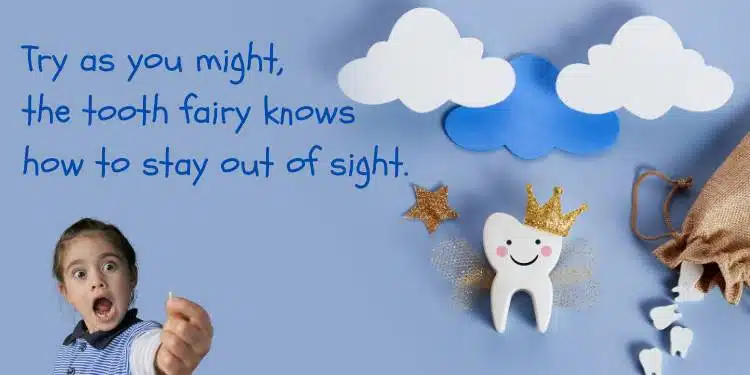
Why Are Childhood Memories So Nostalgic?
Childhood is understood by many to be a time before responsibility. It’s a time when we were carefree and innocent. Nostalgia is often linked to a longing to return to that fantasized state when life felt less complicated. For me, those memories also carry a sense of familiarity and comfort. They are like old friends I can return to when I need a sense of security.
I associate many childhood memories with positive emotions, such as joy, wonder, and happiness. Many of these memories are simple ones that may not mean anything to anyone but me. As I probably idealize some of these emotions, they become nostalgic triggers when I think back on my past. The sensory elements of many of these memories are important too. For example, the smell of my grandmother’s cookies, the sound of my parent’s voices, and the touch of a beloved toy. I remember all of these things with fondness.
Nostalgia serves as a form of emotional self-soothing for me and seems to have a positive impact on my mental well-being by providing comfort, reducing stress, and reinforcing a sense of continuity. It allows me to connect with my past, and sometimes even rekindle or maintain connections with people from earlier years.
What Are Common Childhood Memories?
Childhood memories can vary widely from person to person, but there are some common ones many people share. Most of the time these memories involve simple experiences, yet they still loom large in our minds.
First Day of School
The excitement, nerves, and perhaps a bit of anxiety associated with starting school for the first time or beginning a new grade.
Birthday Parties
Celebrating birthdays with friends, family, cake, and presents is a cherished childhood memory.
Family Vacations
Going on family trips, whether it’s to the beach, a theme park, or a road trip, is often a memorable experience.
Learning to Ride a Bike
The sense of achievement and freedom that comes with learning to ride a bike is a classic childhood memory.
Visiting Grandparents
The special bond between grandchildren and grandparents and the visits to their homes are often cherished memories.
Bedtime Stories
Reading or being read bedtime stories by parents or caregivers is a memory that many associate with comfort and bonding.
Family Meals
Family dinners, Sunday brunches, or gatherings with extended family can create warm and joyful memories.
Building Forts and Treehouses
Constructing secret hideaways or treehouses is a creative and adventurous memory for many.
Picking Fruit or Vegetables
Visiting a farm or garden to pick fruits or vegetables is a tactile and educational memory.
First Pets
The first pet, whether a dog, cat, or any other animal, often holds a special place in a child’s heart.
Learning to Swim
Learning to swim, whether in a pool, at the beach, or at a local lake, is a milestone that many recall.
Lemonade Stands
Setting up a lemonade stand is a small entrepreneurial venture that many children remember.
Childhood Memories Quotes
Here are my five favorite quotes about childhood memories. These quotes capture the essence of childhood as a time of wonder, innocence, and the formation of cherished memories.
“Sometimes you will never know the value of a moment until it becomes a memory.” – Dr. Seuss
“Childhood is the most beautiful of all life’s seasons.” – Unknown
“Memories of childhood were the dreams that stayed with you after you woke.” – Julian Barnes
“The beauty of childhood is that life has cast no shadow on it.” – Milan Kundera
“There is a garden in every childhood, an enchanted place where colors are brighter, the air softer, and the morning more fragrant than ever again.” – Elizabeth Lawrence


